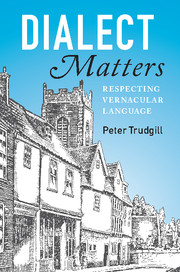Book contents
- Frontmatter
- Dedication
- Epigraph
- Contents
- Foreword
- Acknowledgements
- Map
- Themes
- 1 History: how things came to be this way
- 2 Prescriptivism and other useless pastimes
- 3 Language change: observing and accepting it
- 4 What is happening to words?
- 5 Languages and dialects in contact and conflict
- 6 Respecting English grammar
- 7 Respecting ordinary language
- 8 Sounds and fury
- 9 Respecting local speech
- 10 Grammar: the wonder of it all
- 11 More about words
- 12 Origins
- 13 Accent rules
- 14 Respecting names
- Postscript
- Index
12 - Origins
Published online by Cambridge University Press: 05 August 2016
- Frontmatter
- Dedication
- Epigraph
- Contents
- Foreword
- Acknowledgements
- Map
- Themes
- 1 History: how things came to be this way
- 2 Prescriptivism and other useless pastimes
- 3 Language change: observing and accepting it
- 4 What is happening to words?
- 5 Languages and dialects in contact and conflict
- 6 Respecting English grammar
- 7 Respecting ordinary language
- 8 Sounds and fury
- 9 Respecting local speech
- 10 Grammar: the wonder of it all
- 11 More about words
- 12 Origins
- 13 Accent rules
- 14 Respecting names
- Postscript
- Index
Summary
This section of the book looks at the historical linguistic origins of different types of name associated with East Anglia, and attempts to draw from them conclusions of wider historical and linguistic significance
Anne Boleyn
It is rather well known that French-speaking people do not call our national capital London, they call it Londres. It is perhaps not so well known that the Greeks call it Londino, the Italians Londra, and the Poles Londyn. In Albanian it is called Londer, in Finnish Lontoo, in Lithuanian Londonas and, in the original language of this country, Welsh, it is Llundain.
There is a common tendency for places which have been of historical importance to have different names in different languages. We call München Munich, the Italians call it Monaco, the Poles say Monachium, and the Czech name is Mnichov.
It is not like that for humble settlements, of course. A place such as, say, the Norfolk village of Blickling is not going to be called anything other than Blickling in other languages. And, sadly, even our local capital city has not had foreign-language names in modern times, apart from the Latinised version Norvic, though it was formerly called Noordwijk in Dutch (Yarmouth was Jarmuiden). That is a pity, because having different names in other languages is a sign of fame and distinction.
We ourselves have many English-language names for important centres which are different from their local names: Rome, Athens, Venice, Gothenburg, Florence, Brussels, The Hague, Belgrade, Prague, Lisbon, Cologne, Copenhagen, Naples, Warsaw, Moscow, Vienna are just a few such names. Copenhagen is København in the local language, Vienna is Wien, Prague is Praha, Florence is Firenze.
But some of the English names we used to have for important foreign places have been forgotten. The German city of Trier used to be Treves in English. We originally called Leipzig Leipsic, but most people do not know that anymore. Other names are now in the process of being forgotten. The English for Basel is Basle (pronounced “Bahl”), but Ryanair don't seem to know that. It is probably more common to write Lyon than Lyons these days. Chania in Crete was Canea in English until quite recently. And some Americans talked about Torino during that city's winter Olympics because they did not know that the English name is Turin.
- Type
- Chapter
- Information
- Dialect MattersRespecting Vernacular Language, pp. 173 - 185Publisher: Cambridge University PressPrint publication year: 2016



